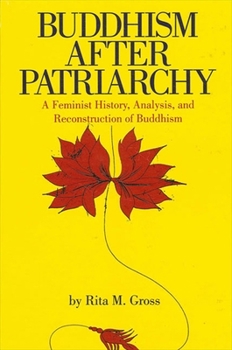Buddhism After Patriarchy: A Feminist History, Analysis, and Reconstruction of Buddhism
Select Format
Select Condition 
Book Overview
This book surveys both the part women have played in Buddhism historically and what Buddhism might become in its post-patriarchal future. The author completes the Buddhist historical record by discussing women, usually absent from histories of Buddhism, and she provides the first feminist analysis of the major concepts found in Buddhist religion. Gross demonstrates that the core teachings of Buddhism promote gender equity rather than male dominance,...
Format:Paperback
Language:English
ISBN:0791414043
ISBN13:9780791414040
Release Date:November 1992
Publisher:State University of New York Press
Length:376 Pages
Weight:1.18 lbs.
Dimensions:0.9" x 6.0" x 9.0"
Customer Reviews
2 ratings
Solid feminist analysis of Buddhism
Published by Thriftbooks.com User , 23 years ago
I learned a great deal from this book.Rita Gross, a professor in comparitive religion, does an excellent job in laying out a strategy by which to analyse Buddhism through an academic feminist viewpoint.This book is not meant to be an introduction to Buddhism, it only briefly covers some of the key elements (history, 4 Noble Truths, Impermanence, Karma, selflessness.) There is also a section that details feminist theory, and schools of feminist thought, which I found very helpful.For each of the elements of Buddhism, she gives several different feminist viewpoints, which allows the reader to better make up his/her mind on these issues.Although she is critical of Buddhism as a whole, I believe Buddhism is based on questioning, and as the Buddha asked people to "see for themselves". Thus, I see this discussion as very healthy for the future of Buddhism.
Why I am not a Buddhist
Published by Thriftbooks.com User , 24 years ago
Why I am not a Buddhist: A review of Buddhism after Patriarchy by Rita Gross My heart goes out to Prajapati. One of the first Buddhists, a relative of Buddha, she created what Buddhism has to offer women, asked for more, for full equality within the religion. Gross documents how Prajapati did this. Yet when she writes about the origin of Buddhist patriarchy she says gender equality was "beyond the Indian imagination of the time," as if Prajapati did not exist. Rita Gross badly wants a tradition she can respect, is nervous because the women's spirituality movement makes mistakes, does not want the full responsibility of reinventing ritual so it respects her. She stops short of calling Buddha on his big mistake, his failure to fully transcend gender, in practice as well as in theory. She takes the liberty of introducing the prophetic feminist voice to Buddhism, but can't seem to accept that taking authority means taking risks and being wrong, as wrong as Buddha. Buddhist patriarchy is responsible for much bad karma where its attitude to women is concerned. Gross does acknowledge that. Why should women be exempt from making mistakes on this scale? We are not, and will only have full authority over ourselves when we realise this. Gross finds it "unthinkable" that Buddhism would not refrain from harming women, then documents two and a half thousand years of sanctified oppression that says otherwise. I want to bonk Gross on the head, send her back to meditate again, until she can feel a ritual that works in a given moment, and realise it may never work again. Institutionalised religion, all of it, with its repetition of past successes, is both an impediment to spiritual progress, and essential to it. It is essential, and Gross provides an excellent clear analysis, a base for reconstructing Buddhism so it ceases harming women. There is much analysis that is absolutely relevant for current spiritual practice, Buddhist and non, for women and for men. But it leaves me undecided about whether Buddhism is part of the baby, or part of the bathwater. Gross states that the life and world that we are born into is fundamentally sane and reasonable, but we often need religion to appreciate that. I have to differ on this point, as animals our basic drives are to have lots of happy, well fed children who give us many grandchildren, and to survive. Our drives simply cannot be fullfilled, we must die, and our children will encounter tragedy. From my perspective (as a biologist) life is fundamentally crazy making, and if religion has a use it allowing us to deal with that creatively. Overall, although I differ from Gross on fundamental points, I should say that her book is simply the best argued, most stimulating book on religion I have ever read.





